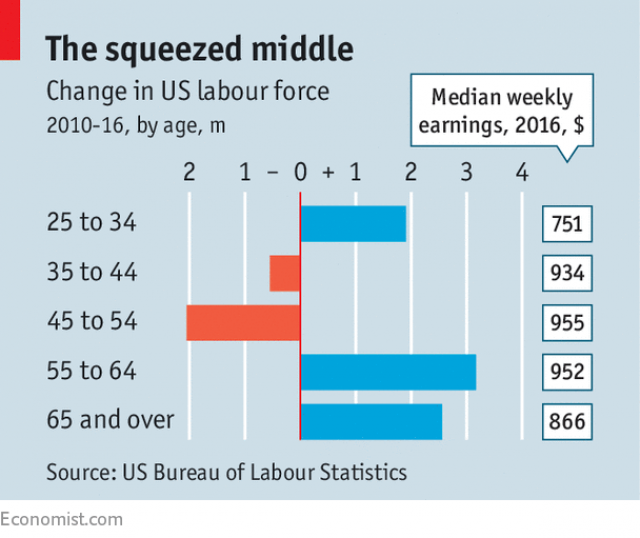- Joined
- Dec 13, 2015
- Messages
- 9,594
- Reaction score
- 2,072
- Location
- France
- Gender
- Male
- Political Leaning
- Centrist
From the Economist (Aug. 2017): Does ageing explain America’s disappointing wage growth?
- excerpt:

Whether we humans are being replaced by advanced robotic machines depends upon the nature of our work. As I never cease to underline, the Bureau of Labor Statistics reports that total manufacturing employment at "Goods-producing, excluding agriculture" remains at only 12% of the total. (See here.)
So the phenomenon is restricted to only that sector of employment. Elsewhere, however, we should be looking at what the Internet is doing to on-the-floor employment in commerce. Shopping malls are reported to be giving way to Internet-commerce.
But does that mean that jobs are being lost if they are recuperated at Internet-commerce companies? Methinks not. The Employment-to-population Ratio is increasing though it has a way to go to get back to pre-2008 levels (see here) ...
- excerpt:

WHEN America’s unemployment was last as low as it has been recently, in early 2007, wages were growing by about 3.5% a year. Today wage growth seems stuck at about 2.5%. This puzzles economists. Some say the labour market is less healthy than the jobless rate suggests; others point to weak productivity growth or low inflation expectations. The latest idea is to blame retiring baby-boomers.
The thinking goes as follows. The average worker gains skills and seniority, and hence higher pay, over time. When he retires, his high-paying job will vanish unless a similarly-seasoned worker is waiting in the wings. A flurry of retirements could therefore put downward pressure on average wages, however well the economy does. The first baby-boomers began to hit retirement age around 2007, just as the financial crisis started. And since 2010, the first full year of the recovery, the number of middle-aged workers has shrunk considerably. They have been replaced partly by lower-earning youngsters (see chart above).
Researchers at the Federal Reserve Bank of San Francisco think this could explain disappointing wage growth over that period. They split earnings growth into the portion caused by pay rises, and the portion caused by people joining or leaving the workforce. From mid-2012 until recently, changes to labour-force composition have reduced income growth by about two percentage points. By comparison, in early 2007 the drag was less than one percentage point. For those in work continuously, pay is rising just as fast as it was then.
Whether we humans are being replaced by advanced robotic machines depends upon the nature of our work. As I never cease to underline, the Bureau of Labor Statistics reports that total manufacturing employment at "Goods-producing, excluding agriculture" remains at only 12% of the total. (See here.)
So the phenomenon is restricted to only that sector of employment. Elsewhere, however, we should be looking at what the Internet is doing to on-the-floor employment in commerce. Shopping malls are reported to be giving way to Internet-commerce.
But does that mean that jobs are being lost if they are recuperated at Internet-commerce companies? Methinks not. The Employment-to-population Ratio is increasing though it has a way to go to get back to pre-2008 levels (see here) ...
Last edited:

